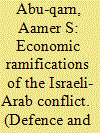| Srl | Item |
| 1 |
ID:
098335


|
|
|
|
|
| Publication |
2010.
|
| Summary/Abstract |
This paper revisits the defence-growth nexus for the rivals of the Israeli-Arab conflict over the last four decades. To this end, we utilize the Toda and Yamamoto (1995) causality test and the generalized variance decomposition. Contrary to the conventional wisdom and many earlier studies, we fail to detect any persistent adverse impact of military expenditures on economic growth. Our conclusions are kept intact even when we account for the possibility of endogenous structural breaks and during the post-1979 peace treaty period. Our findings imply insignificant peace dividends once the conflict is resolved and the military spending is cut to internationally acceptable standards.
|
|
|
|
|
|
|
|
|
|
|
|
|
|
|
|
| 2 |
ID:
129826


|
|
|
|
|
| Publication |
2014.
|
| Summary/Abstract |
Egypt plays a pivotal role in the security of the Middle East as the doorway to Europe and its military expenditure reflects its involvement in the machinations of such an unstable region, showing considerable variation over the last 40?years. These characteristics make it a particularly interesting case study of the determinants of military spending. This paper specifies and estimates an econometric model of the Egyptian demand for military spending, taking into account important strategic and political factors. Both economic and strategic factors are found to play a role in determining military burden/spending, with clear positive effects of lagged military burden, suggesting some sort of institutional inertia, plus negative output and net exports effects. The strategic effect as a result of the impact of Israel's military burden is mostly positive and significant, though its impact is reduced when the impact of important strategic events are taken into account. The military spending of Egypt's allies Jordan and Syria generally seems to have had no effect on Egypt's spending. These results are consistent over a range of econometric techniques.
|
|
|
|
|
|
|
|
|
|
|
|
|
|
|
|
| 3 |
ID:
098333


|
|
|
|
|
| Publication |
2010.
|
| Summary/Abstract |
More than six decades have elapsed since the establishment of the state of Israel, and the Palestinian Nakba (catastrophe) in 1948, which marked the initiation of a long-lasting conflict that has still not yet been resolved. Israelis and Arabs that claim historical solitary rights on the Holy Land have incurred loads of casualties and endured decades of wars, destruction, agony, and a lack of peaceful and prosperous life. The intensity of the conflict is reflected, among other things, by the substantial fraction of the scarce resources that has been allocated to military spending by the adversaries. Throughout the duration of the conflict, Israel and its major rivals, namely Egypt, Jordan and Syria, recorded an internationally unparalleled military burden. Although these countries have cut their defense spending drastically following the initiation of the peace talks, they still maintain exceptionally high military spending in international standards.
|
|
|
|
|
|
|
|
|
|
|
|
|
|
|
|